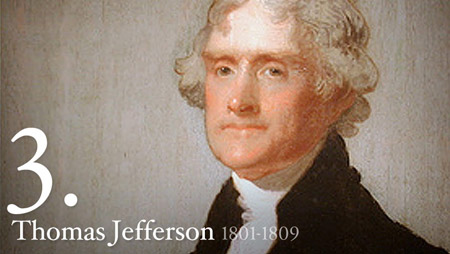
Thomas Jefferson, the third President of the United States, served from March 4, 1801, to March 4, 1809. His presidency was marked by significant achievements in domestic policy, foreign relations, and territorial expansion. This detailed timeline explores the key events and decisions that defined Jefferson’s presidency, shedding light on his visionary leadership and enduring impact on the nation.
Inauguration and Early Initiatives (1801)
March 4, 1801: Thomas Jefferson is inaugurated as the third President of the United States in the new capital, Washington, D.C. His inaugural address emphasizes unity, republican principles, and the protection of civil liberties. Jefferson famously states, “We are all Republicans, we are all Federalists,” underscoring his desire to heal the political divisions of the time.
March 5, 1801: Jefferson writes to Albert Gallatin, his nominee for Secretary of the Treasury, outlining his vision for reducing the national debt, cutting government expenses, and promoting agricultural interests.
Judiciary Act and Marbury v. Madison (1801-1803)
April 29, 1802: Congress passes the Judiciary Act of 1802, repealing the Judiciary Act of 1801 and effectively abolishing the new circuit courts created by the outgoing Federalist administration. This move reflects Jefferson’s efforts to curb Federalist influence in the judiciary and realign the court system with Republican principles.
February 24, 1803: The Supreme Court, under Chief Justice John Marshall, delivers its landmark decision in Marbury v. Madison. The ruling establishes the principle of judicial review, allowing the Supreme Court to declare laws unconstitutional. Although Jefferson disagrees with the decision, it significantly enhances the power of the judiciary.
Louisiana Purchase and Western Exploration (1803-1806)
April 30, 1803: The Louisiana Purchase Treaty is signed, in which the United States acquires approximately 828,000 square miles of territory from France for $15 million. This monumental acquisition doubles the size of the nation and provides immense opportunities for westward expansion.
May 14, 1804: Meriwether Lewis and William Clark embark on the Corps of Discovery Expedition, commissioned by Jefferson to explore the newly acquired western territories. Their journey, which lasts until September 1806, provides valuable information about the geography, flora, fauna, and native peoples of the West.
Domestic Policies and Reforms (1803-1806)
December 8, 1803: In his annual message to Congress, Jefferson advocates for the reduction of military expenditures, the promotion of agriculture, and the need for public education. He also stresses the importance of infrastructure improvements, such as roads and canals, to support economic growth.
February 24, 1804: Congress passes the 12th Amendment, which reforms the electoral process by requiring separate votes for president and vice president. This amendment addresses the electoral issues highlighted by the election of 1800 and helps prevent future electoral crises.
Second Term and Foreign Policy Challenges (1805-1807)
March 4, 1805: Jefferson is inaugurated for his second term, focusing on continuing his policies of limited government, fiscal responsibility, and westward expansion.
June 1805: The First Barbary War concludes with the signing of a peace treaty with Tripoli. The conflict, which began in 1801, highlights Jefferson’s willingness to use naval power to protect American interests and commerce overseas.
January 8, 1806: In his annual message to Congress, Jefferson calls for a national university and the exploration of the American West, reiterating his commitment to education and scientific discovery.
Embargo Act and Economic Strain (1807-1809)
December 22, 1807: In response to ongoing British and French interference with American shipping, Jefferson signs the Embargo Act into law. The act prohibits American ships from trading with foreign ports, aiming to pressure Britain and France to respect American neutrality. However, the embargo severely impacts the U.S. economy, leading to widespread dissatisfaction and smuggling.
March 1, 1809: Recognizing the economic damage caused by the Embargo Act, Congress passes the Non-Intercourse Act, which lifts the embargo on all nations except Britain and France. This move comes just days before Jefferson leaves office, signaling a shift in strategy to address the ongoing trade conflicts.
End of Presidency and Legacy (1809)
March 4, 1809: Thomas Jefferson’s second term comes to an end. He retires to his beloved estate, Monticello, in Virginia, where he continues to engage in intellectual pursuits and correspondence with other prominent figures of the time.
Legacy and Impact
Thomas Jefferson’s presidency was a transformative period in American history. His acquisition of the Louisiana Territory and the subsequent Lewis and Clark Expedition opened vast new lands for exploration and settlement, significantly shaping the future of the United States. His efforts to reduce the national debt and streamline government operations set important precedents for fiscal responsibility.
However, Jefferson’s presidency was not without controversy. The Embargo Act of 1807, intended to protect American interests, instead caused economic hardship and discontent. His handling of the judiciary and his strict interpretation of the Constitution also sparked debates that continue to resonate in American political discourse.
Jefferson’s vision of an agrarian republic, his emphasis on education and scientific inquiry, and his commitment to individual liberties have left an indelible mark on the nation. As we reflect on his presidency, we see a leader who navigated complex challenges with a dedication to principles that continue to shape American identity and values.